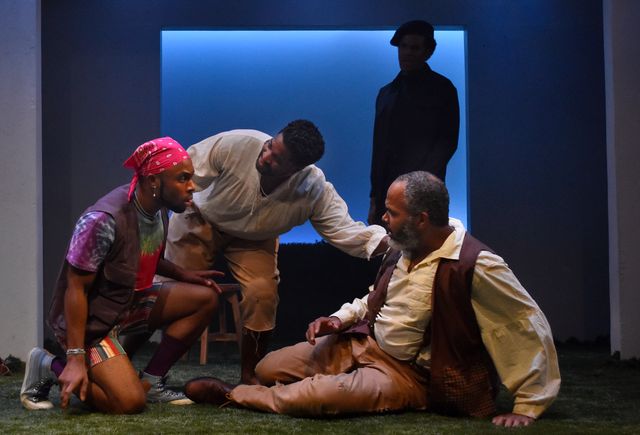
Four Black men from different times meet in unusual circumstances in Mansa Ra’s In the Southern Breeze
IN THE SOUTHERN BREEZE
Rattlestick Playwrights Theater
224 Waverly Pl.
Wednesday – Monday through December 12, $40 in person or livestreamed
www.rattlestick.org
The central section of Mansa Ra’s In the Southern Breeze, which opened last night at Rattlestick, is a compelling fever dream in which four Black men from different time periods meet in a kind of bardo, trying to make sense of their existential situation. Unfortunately, that narrative is framed by a moralizing, didactic story involving a contemporary Black man (Allan K. Washington) literally at the end of his rope, as he considers hanging himself, suffering from severe depression because of pandemic isolation and systemic racism in America.
“It’s so stressful being black. And I don’t mean in some hypothetical way,” he says. The confinement of lockdown is also getting to him. “I honestly have no idea what’s gonna happen anymore. It’s been a while since I’ve interacted with people. Like a super long time. I was already depressed before the ’rona. Everybody was freaking out about quarantine cooped up with nowhere to go. But I was glad. I finally had a real excuse for not leaving my apartment. I know a lot about isolation. It feels like the walls are closing in around you. All day. And all night.”
While he contemplates his fate (offstage), a barefoot man in tatters enters. Madison (Charles Browning) is a runaway slave, just trying to stay alive while looking for his wife. He is soon joined by Lazarus (Victor Williams), a sharecropper who wants to know where his family is. Next, a Black Panther named Hue (Biko Eisen-Martin) arrives, calling out desperately for his wife. And finally, gay activist Tony (Travis Raeburn) shows up fresh from a protest march. As a group they represent such societal ills as racism, homophobia, injustice, inequality, and disenfranchisement, in search of their identity, separated from their wives and children as so many Black men have been throughout the history of the United States. “Unnatural fo’ a man to be taken ’way from his family. Just unnatural,” Madison says. It is critical to note that there are no women in the play; they exist on the periphery, longed-for sources of strength and ancestral continuity. Emmie Finckel’s set is a series of ever-smaller white-framed doorways on lush green grass, the promise of freedom closing fast.

In the Southern Breeze looks at loneliness, depression, racism, and isolation
Earnestly directed by Christopher D. Betts, In the Southern Breeze’s frame story ends up feeling like a cliched diatribe of platitudes lacking dramatic nuance; what the man is experiencing is horrific, something that no one should have to endure, but it comes off as more of an intense therapy session. A rant about holes, from the noose to anal sex to the planet Saturn, feels forced and unnecessary. The body of the play is powerful; Mansa Ra (fka Jiréh Breon Holder) should have more faith in his audience. For example, there is a moment near the end that could have made a memorable conclusion, but instead the narrative extends with a coda that plots out too easy a path for what is a complicated future. One of the smartest choices is to never show an actual noose, serving as a potent metaphor for what has lurked dangerously for centuries.
In her essay “Moral Inhabitants,” which influenced Mansa Ra, Nobel Prize winner Toni Morrison writes, “Our past is bleak. Our future dim. But I am not reasonable. A reasonable man adjusts to his environment. And unreasonable man does not. All progress, therefore, depends on the unreasonable man. I prefer not to adjust to my environment. I refuse the prison of ‘I’ and choose the open spaces of ‘we.’” In the Southern Breeze works best when it deals with the “we” as opposed to the “I.”
In conjunction with the seventy-five-minute play, which runs through December 12 (both at the theater and streaming live) and is presented in partnership with Black Boys Do Theater, the Boys’ Club of New York, the Eastern Group Psychotherapy Society, and the National Alliance on Mental Illness, Rattlestick is hosting a series of community talks, on November 22 at 5:00 (on Zoom, before the livestream, about safe and private spaces), November 28 at 4:00 (an in-person postshow discussion exploring the intersection of mental health and the political and social climate), and December 6 at 5:00 (on Zoom, before the livestream).